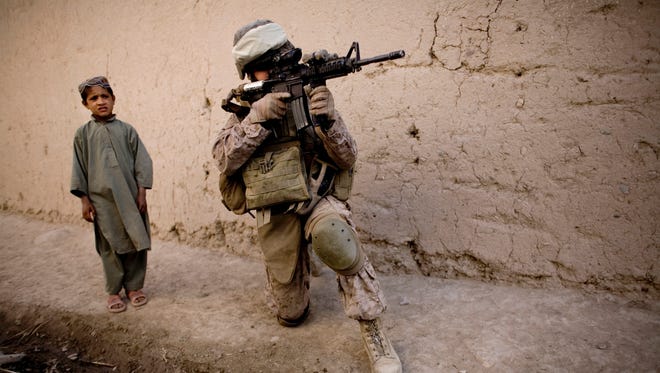Pakistan's ambassador: We want to work with Trump to end war in Afghanistan

The Pakistani government is willing to work closely with the Trump administration to find a political solution to end the war in Afghanistan, the ambassador to the United States pledged this week.
Pakistani Ambassador Aizaz Chaudhry said in an interview with USA TODAY that the government will help promote peace talks between the U.S.-backed Afghan government and rebel Taliban group " in whatever manner it can."
He said Pakistan would use its considerable influence over the Taliban to prod the insurgent group to the negotiation table.
Chaudhry spoke after President Trump and Secretary of State Rex Tillerson vowed this week to step up pressure on Pakistan to work harder with its neighbor to the west to end the nearly 16-year-old war.
"Pakistan believes that there should be peace talks with a clear commitment of the government of Afghanistan," Chaudhry said Wednesday, adding that his country has consistently supported the need for an Afghan-led peace process.
Pakistan has its own Taliban movement fighting the government but some agencies, such as the Intelligence services, have been accused by the U.S. and other governments of supporting the Taliban in Afghanistan.
President Trump on Monday lashed out at Pakistan, urging it to stop giving sanctuary to "agents of chaos, violence and terror." “We can no longer be silent about Pakistan’s safe havens for terrorist organizations, the Taliban and other groups that pose a threat to the region and beyond,” Trump said.
On Tuesday, Tillerson raised the prospects of sanctions against Pakistani government officials, the cut off of aid and putting in jeopardy Pakistan's military partnership with NATO. The Trump administration also has hinted it may improve ties with Pakistan's arch-enemy, India.
But on Thursday Pakistan's top political and military leaders offered a stark response to Trump's accusations, telling the U.S. president that scapegoating Pakistan will not bring peace to Afghanistan.
Rejecting Trump's allegation that Pakistan harbors militants, the Pakistani officials demanded that the U.S. military eliminate extremists who use Afghan soil to stage attacks in Pakistan.
The response followed an hours-long meeting between Prime Minister Shahid Khaqan Abbasi and army chiefs, all members of the National Security Committee — Pakistan's top forum on issues relating to the country's defense and security.
The Pakistani ambassador said Wednesday that his government has reversed the tide of terrorism in Pakistan but it is aware that Pakistan's gains against terrorists and its economic progress will remain in jeopardy so long as Afghanistan is unstable.
"We, therefore, believe a comprehensive political process must be pursued in earnest to secure lasting peace and stability in Afghanistan," he said.
Chaudhry said management of the over 1,500 mile-long Pakistani border with Afghanistan is critical to stopping cross border movement of militants, and that his country has started fencing the border.
"Related issues such as repatriation of refugees back to Afghanistan in honor and dignity as well as a close cooperation between Pakistan and Afghanistan would also be of singular importance," the ambassador said.
Some of these topics have already been discussed through back-channel talks between the U.S. and Pakistan.
On Aug. 11, a group of former diplomats, military officials and security experts from the two countries held their third meeting in six months to discuss Pakistan's support in Afghanistan, increased U.S. ties with India, India's role in Afghanistan and Pakistan's growing economic reliance on China.
Richard Boucher, a former U.S. assistant secretary of State for South and Central Asian Affairs who attended the talks, said Pakistan and Afghanistan must control their borders to achieve peace.
Boucher acknowledged that Pakistan has expanded its control of its territory, especially into the tribal areas, but stressed that the government "still needs to control its border to prevent fighters and supplies from moving across in both directions."
More:Here's how Trump's position on Afghanistan has shifted over time
Analysis:Trump's new Afghanistan war strategy reflects a lack of winning options
More:Afghanistan endorses Trump's revised strategy; Taliban warns of 'graveyard'